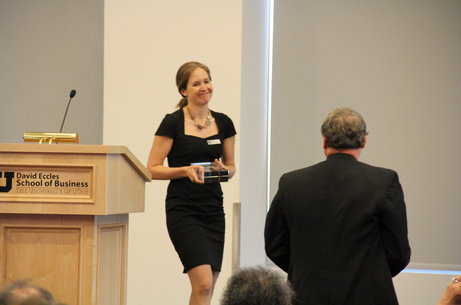
Gates Cambridge Scholar Libby Blanchard has set up an ethical leadership awards programme in Utah to highlight best practices and inspire others.
A Gates Cambridge Scholar has set up an ethical leadership awards programme in Utah to highlight best practices and inspire others.
Libby Blanchard [2012], who is doing a PhD in Geography, collaborated with both the Community Foundation of Utah and the David Eccles School of Business at the University of Utah to set up the awards programme. It is sponsored by the Daniels Fund, a foundation that promotes ethical leadership in the American West. The Fund has also sponsored ethics awards programmes for business in Colorado and New Mexico, but this is the first time they have sponsored an ethics awards programme that includes non-profits and government entities.
The awards programme is, in part, a response to negative press around unethical behaviour by two consecutive Attorney Generals in Utah. Libby says: “This awards programme works to celebrate the ethical leadership in businesses, non-profits and government entities that is occurring on a day-to-day basis within the State of Utah.”
The first finalists and winners of the Utah Ethical Leadership Awards were announced last week at an awards ceremony held at the University of Utah David Eccles School of Business. One of the key speakers was Utah Governor Gary Herbert, who said: “The Utah Ethical Leadership Awards recognise Utah businesses, non-profit organisations and government entities that embody best practices in ethical behaviours. The finalists and awardees are a great representation of Utah’s principle-based ethical leadership.
The three winners were engineering firm WesTech, the Utah State Office of Rehabilitation for its work empowering people with disabilities to enter meaningful careers where they can maximise their independence and self-reliance, and The Road Home, a non-profit organisation which serves homeless people. Libby said of The Road Home: “They believe in the inherent dignity of each and every person who comes to the agency in time of need, and exemplify the ethical principles of respect and trust.”
The Awards programme was launched earlier in the year to recognise and support the ethical leadership of organisations in the state of Utah and to recognise organisations that embody the spirit of ethical leadership exhibited by Bill Daniels, a founder of the modern cable industry and former owner of the Utah Stars.
Taylor Randall, Dean of the University of Utah’s business school, said: “The Awards will serve as inspiration for years to come for the future business leaders coming out of the David Eccles School of Business.”
Harris Sondak, the Daniels Professor of Ethics at the David Eccles School of Business, University of Utah, praised Libby’s role in the establishment of the awards. He said: “Libby took the lead on this project right from the start. She provided the direction for our students, who designed a method for measuring companies in terms of the specific ethical principles embraced by the Daniels Fund Ethics Consortium. She arranged to validate those measures with leaders of our business community. Libby solicited nominations for the awards, and coordinated the judging of those nominations. And Libby took the lead in making arrangements for and publicising the awards ceremony, which came off with flying colours and great acclaim from finalists and funders alike.”
Abe Bakhshesky, the Bill Daniels Professor of Ethics at the David Eccles School of Business, University of Utah, added: “The success of the event was a great deal due to her dedication and support.”
More information: www.utahcf.org/ethics












